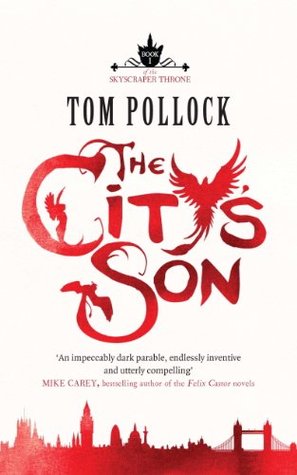The City's Son is a young adult urban fantasy novel set in London. Its main characters are Beth, a streetsmart girl, and Filius, the son of the absent goddess of the city. After being kicked out of school, Beth seeks out her usual hide-out, an abandoned railway line. She encounters a ghostly train, after which she finds herself in other-London, Un-Lun-Dun, Neverwhere-London, the city inside the city, where spirits roam, statues are alive, scaffolds are scaffwolves, streetlamps have personalities and tribes...
It starts out pacey and keeps up a decent pace throughout, as Filius takes Beth along, wandering from tribe to tribe to try to gather their support for an upcoming war against his mother's nemesis, Reach. There's plenty of action - too much action, in fact, with confrontations and scenes that take several pages to go through just a few seconds of fight. I tend to find blow-by-blow accounts distracting / disruptive to pace, so I sometimes skimmed a little.
The story is quite entertaining and the world interesting enough. This is urban fantasy closer to Neverwhere, Kraken and Un-Lun-Dun in atmosphere: it's not really London at all, but a fantasy world which simply shares some of the place names and some of the aesthetic. (Of all the urban fantasies in London, only Ben Aaranovitch's Peter Grant series does it masterfully, interweaving the different worlds in a way which stays just on the right side of believable)
One of the things which I found quite pleasing at the start is that one of the side characters, Pen, is a Muslim teenage girl, who's basically just a regular teenager with a somewhat more conservative family. There are not enough characters like her in novels - or at least, not enough of them in novels that are about something else.
On the other hand, the novel had some aspects which I found uncomfortable. Aside from the many characters who die (or, worse, are permanently mutilated in some way), there is a rape sub plot. That did not feel right at all, to have a minor sub plot about sexual abuse and rape, treated with little seriousness and more or less a shrug... then I started wondering whether it might not be a bad thing to handle rape that way in a novel. If rape is very common, and if (real world) victims have to find ways to cope and get over it, does it help if it's always a person-defining horror in stories? Should it just be something that happens to fictional characters before they shrug and move on? I don't know - it still feels somehow insensitive / blase to just throw it into a light entertainment urban fantasy tale for teenagers.
I think it's likely I'll buy the next book in the series, but I find myself hoping it'll churn through fewer characters and be a bit less brutal: this book treated its world with affection and its characters with a cheesegrater.
Rating: 3.5/5

No comments:
Post a Comment